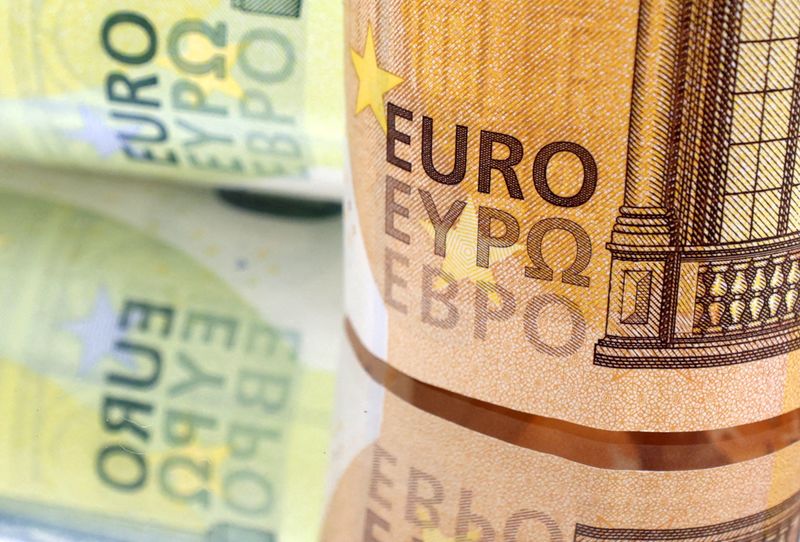By Naomi Rovnick and Dhara Ranasinghe
LONDON (Reuters) -Traders kept the euro on course for a strong comeback on Thursday as prospects of the European Central Bank turning cautious following an expected second rate cut in September wiped worries about French politics from the currency’s path.
With global markets lining up for quick US rate cuts, the ECB signaled heightened concerns about volatile inflation, helping sustain an upward shift for the euro that neared a four-month high after being shaken due to the unrest in the French government in June.
The ECB left its deposit rate unchanged at 3.75%, after cutting it from 4% in June for the first time in five years. President Christine Lagarde emphasized that she was not bound to a specific interest rate path.
By contrast, Federal Reserve Chairman Jerome Powell said Monday he was more confident that U.S. inflation had actually moderated.
That has, at least temporarily, helped strengthen the euro, sending the currency up more than 2% against the dollar so far this month after falling about 1% in June.
The euro was trading around $1.093 on Thursday, down slightly on the day but still on track for its biggest monthly gain since November.
“Extreme scenarios around French political risk are subsiding and markets are confident that the Fed will cut rates soon and we are starting to see weakness for the dollar against most currencies,” said Lombard Odier macro strategist Bill Papadakis .
But the euro has fallen against the Swiss franc and sterling this month. And investors warned that the euro would not be an immediate choice if Donald Trump were to win the US presidential election in November. Trump has proposed tariffs that could hurt the eurozone economy, revive U.S. inflation and send U.S. interest rates and the dollar higher.
“We expect the interest rate differential between the eurozone and the US to narrow, which should lead to some dollar depreciation,” said Amelie Derambure, a multi-asset portfolio manager at Amundi.
“But markets see a Trump victory as a bullish event for the dollar, so depreciation will be limited until the election.”
CURRENCY COMEBACK INSURED?
The money markets are expecting more than two interest rate cuts from the Fed by the end of the year, and just under two for the ECB.
The dollar has outperformed most of its rivals over the past year, but has seen its crown slip as interest rate support fades. The index that measures the dollar against major peers is 2% lower so far in July.
The euro, meanwhile, has recovered from a fall in June, when it hit a two-month low against the dollar, as French President Emmanuel Macron’s early parliamentary elections sparked political instability in the heart of the eurozone and the deep budget deficit of France. .
The prospects of eurozone members feuding over a French budget emergency in June revived memories of previous euro sovereign debt crises, pushing the single currency project to the brink of collapse.
Those fears are subsiding as the additional income traders demand to hold French 10-year bonds over their German equivalents now stands at around 65 bp, after briefly rising to a 14-year high of 85 bp in June.
“Our view is that the ECB will cut in September and again in the fourth quarter, but they are in a slow cycle of rate cuts,” said David Zahn, head of European fixed income at Franklin Templeton.
DELAY RISKS
Lagarde hinted on Thursday that she is concerned about growth in the eurozone in the context of possible global trade wars.
Trump’s pledge to raise tariffs posed a serious risk to the currency bloc’s export-oriented economy, said Benjamin Melman, CIO of Edmond de Rothschild’s Asset Management.
“China is leading the way because it has more political impact, but Europe can also be an easy target,” he said.
Melman, who expects the ECB’s deposit rate not to exceed 2.5% at the end of 2025, is positive on short-term government bonds, which are benefiting from interest rate cut expectations.

Konstantin Veit, portfolio manager at bond fund PIMCO, said he doesn’t see any major moves in the euro against the dollar as of now.
“They (ECB policymakers) are in no hurry.”


